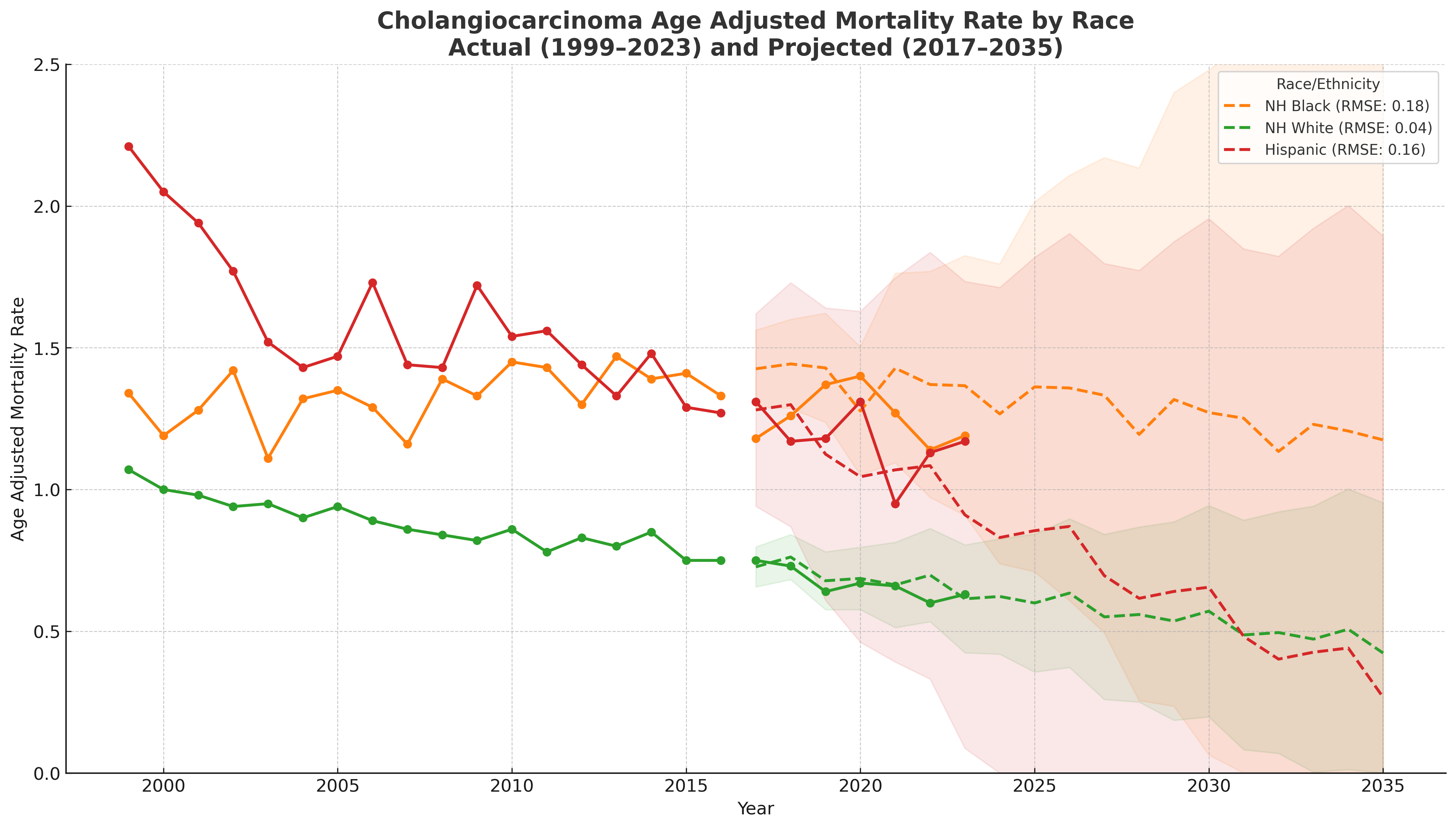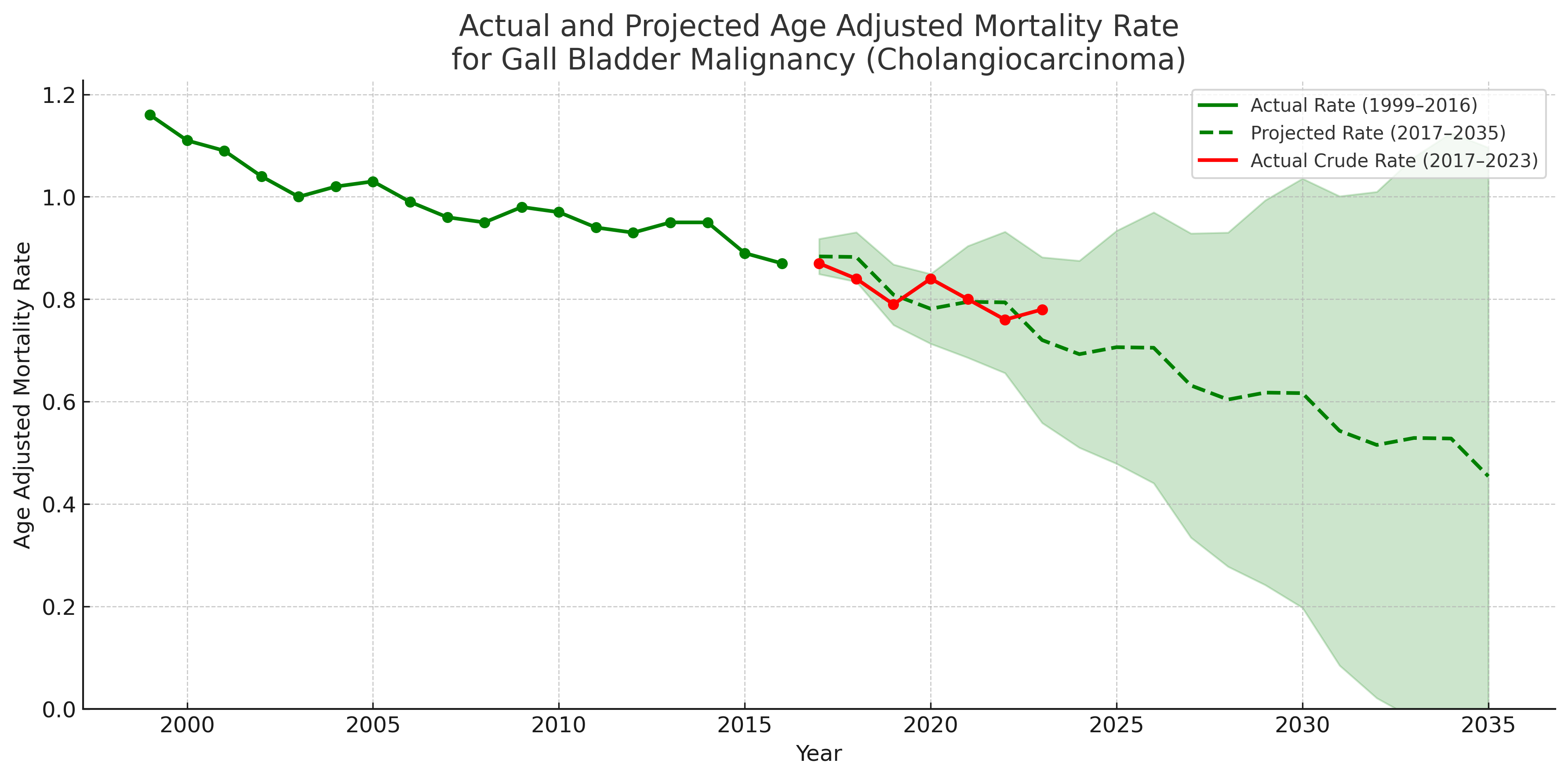Sunday Poster Session
Category: Biliary/Pancreas
P0045 - Artificial Intelligence-Based Machine Learning to Understand the Future of Declining Cholangiocarcinoma Mortality in the United States: A Time Series Modeling Approach
Sunday, October 26, 2025
3:30 PM - 7:00 PM PDT
Location: Exhibit Hall

Tooba Laeeq, MD (she/her/hers)
Kirk Kerkorian School of Medicine at the University of Nevada Las Vegas
Las Vegas, NV
Presenting Author(s)
Noor Ul Huda Ramzan, MD1, Saif Ur Rehman, MBBS2, Tooba Laeeq, MD3, Khadija Mohib, MD3, Mian Uman Anwer, MBBS4, Muhammad Bilal Hashmat, MBBS4, Amina Abbas, MBBS5, Amna Amjad, MBBS4, Muhammad Haseeb, MBBS6, Fatima Iqbal, MBBS7, Rameen Bilal, MBBS7
1University of Texas Southwestern Medical Center, Dallas, TX; 2bacha khan, Mardan, North-West Frontier, Pakistan; 3Kirk Kerkorian School of Medicine at the University of Nevada Las Vegas, Las Vegas, NV; 4Punjab Medical College, Faisalabad, Punjab, Pakistan; 5Allama Iqbal Medical College, Lahore, Punjab, Pakistan; 6Faisalabad Medical University, Faisalabad, Punjab, Pakistan; 7Punjab Medical College Faisalabad, Faisalabad, Punjab, Pakistan
Introduction: Though relatively rare, cholangiocarcinoma carries a high fatality rate and is often diagnosed at an advanced stage, limiting treatment options. By forecasting future mortality rates, researchers and policymakers can better anticipate the healthcare burden, identify at-risk populations, and allocate funding toward early detection and treatment research.
Methods: We utilized data from the CDC WONDER database spanning 1999 to 2023 to examine cholangiocarcinoma-related mortality, identified using ICD-10 codes C22.1 and C24. Mortality was assessed using crude mortality rates (CMRs) per 100,000 population, stratified by age, sex, and race. Temporal patterns were analyzed through annual and average annual percent changes (APC and AAPC), employing the empirical quantile method for confidence intervals. A Seasonal Autoregressive Integrated Moving Average (SARIMA) model was developed to forecast mortality trends through 2035, trained on data from 1999 to 2016, and validated with figures from 2017 to 2023 using time series cross-validation. Model accuracy was evaluated via root mean square error (RMSE), and projections were extended to 2035.
Results: Between 1999 and 2023, the age-adjusted mortality rate (AAMR) for cholangiocarcinoma in the U.S. declined from 1.16 to 0.78 per 100,000, reflecting an average annual percent change of −1.59% per year. Similarly, crude mortality rates have declined from 1.14 to 0.94 per 100,000 over the same period. Females consistently exhibited higher mortality than males, with AAMR decreasing from 1.43 to 0.95 in women, and from 0.79 to 0.57 in men.
Our model forecasts that the overall AAMR mortality from cholangiocarcinoma will decrease from 0.72 in 2023 to 0.45 per 100,000 in 2035. The average annual percentage change will be -3.84% over the next 12 years, resulting in a relative reduction (RR) of -37.5% in mortality due to cholangiocarcinoma.
Hispanics will see the largest drop in their AAMR, going from 1.17 in 2023 to 0.38 in 2035, AAPC−8.9%, and a RR of −67.5.For White Americans, there will be a decline from 0.63 to 0.45, AAPC of −2.76%, and a RR of−28.6%. The AAMR for African Americans will stay relatively stable, only changing from 1.19 in 2023 to 1.15 in 2035.
Discussion: Our analysis reveals that cholangiocarcinoma mortality will continue to decline significantly over the next 12 years through 2035, yet the African American mortality rate will remain high. Targeted interventions must be made in this racial group to improve health outcomes.

Figure: Graph showing Cholangiocarcinoma Age Adjusted Mortality Rate by Race, Actual (1999-2023) and Projected (2017-2035)

Figure: Graph showing Actual and Projected Age-Adjusted Mortality Rate for Gall Bladder Malignancy (Cholangiocarcinoma)
Disclosures:
Noor Ul Huda Ramzan indicated no relevant financial relationships.
Saif Ur Rehman indicated no relevant financial relationships.
Tooba Laeeq indicated no relevant financial relationships.
Khadija Mohib indicated no relevant financial relationships.
Mian Uman Anwer indicated no relevant financial relationships.
Muhammad Bilal Hashmat indicated no relevant financial relationships.
Amina Abbas indicated no relevant financial relationships.
Amna Amjad indicated no relevant financial relationships.
Muhammad Haseeb indicated no relevant financial relationships.
Fatima Iqbal indicated no relevant financial relationships.
Rameen Bilal indicated no relevant financial relationships.
Noor Ul Huda Ramzan, MD1, Saif Ur Rehman, MBBS2, Tooba Laeeq, MD3, Khadija Mohib, MD3, Mian Uman Anwer, MBBS4, Muhammad Bilal Hashmat, MBBS4, Amina Abbas, MBBS5, Amna Amjad, MBBS4, Muhammad Haseeb, MBBS6, Fatima Iqbal, MBBS7, Rameen Bilal, MBBS7. P0045 - Artificial Intelligence-Based Machine Learning to Understand the Future of Declining Cholangiocarcinoma Mortality in the United States: A Time Series Modeling Approach, ACG 2025 Annual Scientific Meeting Abstracts. Phoenix, AZ: American College of Gastroenterology.
1University of Texas Southwestern Medical Center, Dallas, TX; 2bacha khan, Mardan, North-West Frontier, Pakistan; 3Kirk Kerkorian School of Medicine at the University of Nevada Las Vegas, Las Vegas, NV; 4Punjab Medical College, Faisalabad, Punjab, Pakistan; 5Allama Iqbal Medical College, Lahore, Punjab, Pakistan; 6Faisalabad Medical University, Faisalabad, Punjab, Pakistan; 7Punjab Medical College Faisalabad, Faisalabad, Punjab, Pakistan
Introduction: Though relatively rare, cholangiocarcinoma carries a high fatality rate and is often diagnosed at an advanced stage, limiting treatment options. By forecasting future mortality rates, researchers and policymakers can better anticipate the healthcare burden, identify at-risk populations, and allocate funding toward early detection and treatment research.
Methods: We utilized data from the CDC WONDER database spanning 1999 to 2023 to examine cholangiocarcinoma-related mortality, identified using ICD-10 codes C22.1 and C24. Mortality was assessed using crude mortality rates (CMRs) per 100,000 population, stratified by age, sex, and race. Temporal patterns were analyzed through annual and average annual percent changes (APC and AAPC), employing the empirical quantile method for confidence intervals. A Seasonal Autoregressive Integrated Moving Average (SARIMA) model was developed to forecast mortality trends through 2035, trained on data from 1999 to 2016, and validated with figures from 2017 to 2023 using time series cross-validation. Model accuracy was evaluated via root mean square error (RMSE), and projections were extended to 2035.
Results: Between 1999 and 2023, the age-adjusted mortality rate (AAMR) for cholangiocarcinoma in the U.S. declined from 1.16 to 0.78 per 100,000, reflecting an average annual percent change of −1.59% per year. Similarly, crude mortality rates have declined from 1.14 to 0.94 per 100,000 over the same period. Females consistently exhibited higher mortality than males, with AAMR decreasing from 1.43 to 0.95 in women, and from 0.79 to 0.57 in men.
Our model forecasts that the overall AAMR mortality from cholangiocarcinoma will decrease from 0.72 in 2023 to 0.45 per 100,000 in 2035. The average annual percentage change will be -3.84% over the next 12 years, resulting in a relative reduction (RR) of -37.5% in mortality due to cholangiocarcinoma.
Hispanics will see the largest drop in their AAMR, going from 1.17 in 2023 to 0.38 in 2035, AAPC−8.9%, and a RR of −67.5.For White Americans, there will be a decline from 0.63 to 0.45, AAPC of −2.76%, and a RR of−28.6%. The AAMR for African Americans will stay relatively stable, only changing from 1.19 in 2023 to 1.15 in 2035.
Discussion: Our analysis reveals that cholangiocarcinoma mortality will continue to decline significantly over the next 12 years through 2035, yet the African American mortality rate will remain high. Targeted interventions must be made in this racial group to improve health outcomes.

Figure: Graph showing Cholangiocarcinoma Age Adjusted Mortality Rate by Race, Actual (1999-2023) and Projected (2017-2035)

Figure: Graph showing Actual and Projected Age-Adjusted Mortality Rate for Gall Bladder Malignancy (Cholangiocarcinoma)
Disclosures:
Noor Ul Huda Ramzan indicated no relevant financial relationships.
Saif Ur Rehman indicated no relevant financial relationships.
Tooba Laeeq indicated no relevant financial relationships.
Khadija Mohib indicated no relevant financial relationships.
Mian Uman Anwer indicated no relevant financial relationships.
Muhammad Bilal Hashmat indicated no relevant financial relationships.
Amina Abbas indicated no relevant financial relationships.
Amna Amjad indicated no relevant financial relationships.
Muhammad Haseeb indicated no relevant financial relationships.
Fatima Iqbal indicated no relevant financial relationships.
Rameen Bilal indicated no relevant financial relationships.
Noor Ul Huda Ramzan, MD1, Saif Ur Rehman, MBBS2, Tooba Laeeq, MD3, Khadija Mohib, MD3, Mian Uman Anwer, MBBS4, Muhammad Bilal Hashmat, MBBS4, Amina Abbas, MBBS5, Amna Amjad, MBBS4, Muhammad Haseeb, MBBS6, Fatima Iqbal, MBBS7, Rameen Bilal, MBBS7. P0045 - Artificial Intelligence-Based Machine Learning to Understand the Future of Declining Cholangiocarcinoma Mortality in the United States: A Time Series Modeling Approach, ACG 2025 Annual Scientific Meeting Abstracts. Phoenix, AZ: American College of Gastroenterology.
